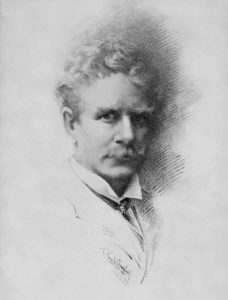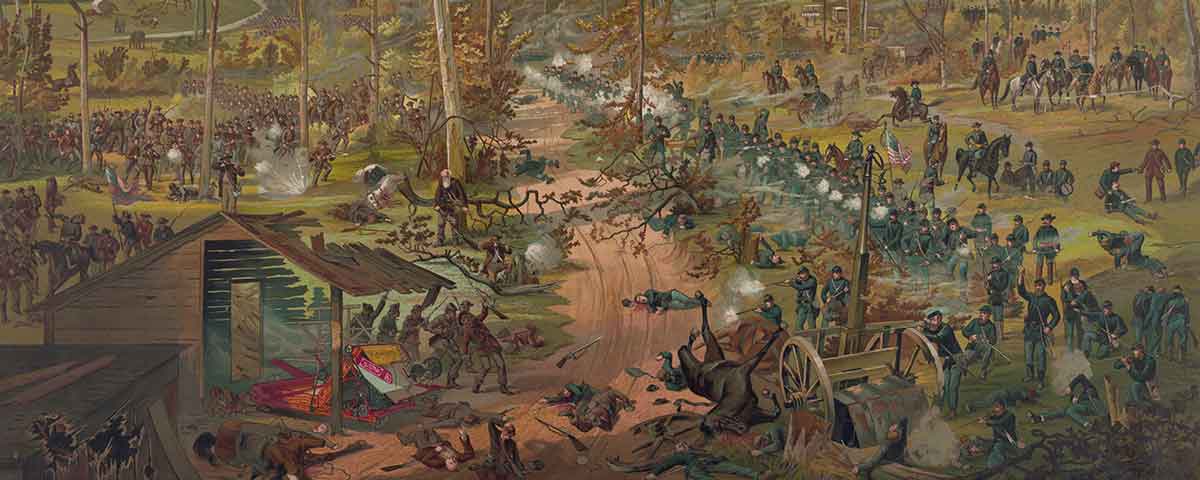Ambrose Bierce’s Tormented view of war
In Still Life: From the Notebooks of Ambrose Bierce, 1862, 20th-century poet R.T. Smith presents a sketch artist who, despite being surrounded by the sights and smells and sounds of the aftermath of the April 1862 Battle of Shiloh, chooses to draw a still life of a peach. An “Illinois corporal” peering over the artist’s shoulder can’t believe it: “Fellow, can you see all them soldiers blown apart or in pain right here?…Peaches, what the hell.” Replies the artist, “Peaches, maybe are what I need to see, what my weary heart yearns to remember….I know the bloodbath we inhabit, sir, against which I can offer only a fragile moment as counterpoint.” He goes on to theorize about art and death. Bierce, the mostly silent observer in the poem, thinks, “Just a witness, I held my tongue but had no more appetite for the taste of his beautifully rendered fruit.” But the corporal puts it more bluntly: “Mister, get yourself a rifle, see if you can still puke out them jackass lies.”
Although written more than a century after Bierce died, Still Life offers the kind of hard-edged but slightly off-kilter vignette the legendary veteran, journalist, and “professional cynic” would have enjoyed. Bierce’s fiction typically undermines the “drums and bugles” narratives of battles that had dominated war literature during the last third of the 19th century. Almost all of his stories show men doing their duty against their better judgment, being manipulated by cowardly or glory-seeking officers, or experiencing deep ambivalence about the war in which they found themselves. But a deeper reading of some of Bierce’s works betrays a more nuanced attitude toward the men who fought the war.
In one of Bierce’s most famous stories, “The Coup de Grâce,” a young officer puts his horribly wounded friend out of his misery by plunging a sword through his breast. In the story, this act of harsh kindness propels a plot line revolving around misplaced compassion, duty, human cruelty, and hatred. But it echoed a scene he had witnessed at the actual Battle of Shiloh, when his unit was working its way through a ravaged portion of the battlefield. They came across a man, still alive, but with the top of his head sliced open by a bullet. As his brains spilled onto the ground, he “lay face upward, taking in his breath in convulsive, rattling snorts.” One of Bierce’s men asked if he should end his struggles with a bayonet. “I told him I thought not; it was unusual, and too many were looking.”
In re-creating this scene decades later—with a very different, more meaningful, and much braver ending—Bierce seems to be wishing that he’d had the courage to kill that dying man. The feelings he seems to be expressing over his failure to be that person is just one of his many complicated responses to the war, and to his having survived it. His courage had failed, and he blamed himself for being so cowardly and conventional.
Bierce’s stories have an “us against them” quality that pits the dutiful helplessness of the mass of soldiers against the officers and politicians whose personal agendas and foibles doom hundreds of thousands of men to unnecessary deaths.

see his war scars. (Bettmann/Getty Images)
This surfaces in a few essays and fragments he wrote long after the war. One of his more elegiac short pieces, “A Bivouac of the Dead,” describes his visit to an old battlefield in West Virginia, where he had fought in a skirmish as a young man a half-century before. He remarks on the well-tended graves of the Union soldiers who had fallen there, but focuses on the nearby graves of a few dozen Confederates. The graves had sunk into the ground, with only a few scattered stone markers. This inadequate remembrance galls him: “They were honest and courageous foemen, having little in common with the political madmen who persuaded them to their doom and the literary bearers of false witness in the aftertime.” He slams the “fury of the non-combatant” and the “thunder of the civilians” who, by ignoring these remote graves, are “impair[ing] the dignity and infinite pathos of the Lost Cause.” Yet, even as he suggests an admiration, or at least respect, for the dead soldiers, he describes them as having been “persuaded to…their doom” by “political madmen.”
It struck me in re-reading this line and a few of his other nonfiction pieces that, even when Bierce seems to be completely sympathetic to his fellow soldiers, he can’t help but portray them as dupes complicit in their own victimhood. This is especially salient in his famous nonfiction piece, “What I Saw of Shiloh.” Much of the essay is a dispassionate but highly descriptive account of the chaos and carnage he observed as he (then a lieutenant) and his company arrived after the first day’s fighting. At one point, Bierce discovers a ravine where wounded Yankees had been trapped by a fire. Bloated and discolored, the bodies still betrayed the agony of their deaths. Even as Bierce accepts the tragedy of these men’s torture—“Faught! I cannot catalogue the chars of these gallant gentlemen”—he undercuts their bravery and his own sympathy by adding: “who had got what they enlisted for.”
Although Bierce always makes clear his hatred of the politicians who started the war, and the generals who sent thousands of men to cruel deaths, his musings on Shiloh reveal that he also loathes virtually any soldier who submitted to war. He might mourn their deaths, and rue the decisions that killed them, but he basically declares that they share culpability in their own deaths.
Bierce ends “What I Saw of Shiloh” with a passage reminiscent of Oliver Wendell Holmes Jr. “How they come back to me,” he writes of those years of death and courage in his youth, “dimly and brokenly but with what a magic spell.” Like Holmes, he catalogs the sights and sounds of those long ago days, and the contemporary experiences that bring them rushing back. His final sentence reads like a prayer to be young again—“Ah, Youth….Give me but one touch of thine artist hand upon the dull canvas of the Present; gild for but one moment the drear and somber scenes of to-day”—until he closes with a startling finale: “and I will willingly surrender another life than the one that I should have thrown away at Shiloh.” It’s hard to avoid the notion that his contempt for the bravery of his fellow Union soldiers and their foes—the bravery that he himself displayed in years of hard and dutiful soldiering—originated in a deep regret and resentment that those men who had died, as well as those who had survived, had succumbed to cheap patriotism and empty sentiments.
Because, of course, he had succumbed with them.
James Marten is professor and chair of the History Department at Marquette University, and author of Sing Not War: The Lives of Union and Confederate Veterans in Gilded Age America and America’s Corporal: James Tanner in War and Peace. This article was first published in Muster, The Journal of the Civil War Era blog.





